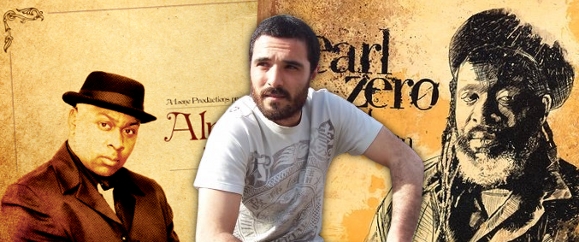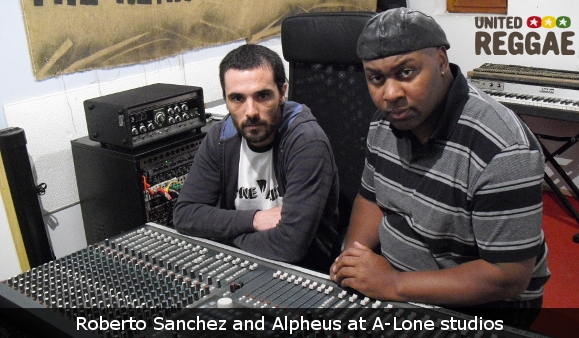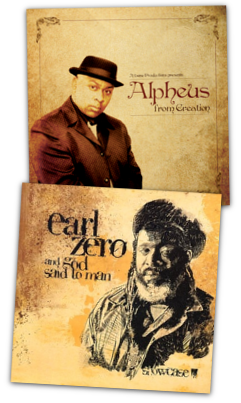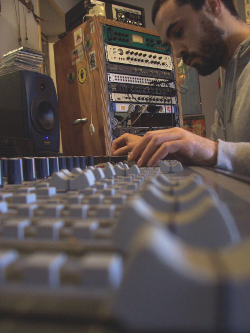Articles about reggae music, reviews, interviews, reports and more...
Interview: Roberto Sanchez
- Home
- Articles
- Interviews
- Interview: Roberto Sanchez

Interview: Roberto Sanchez
"I honestly think people in Europe are playing better roots music than in Jamaica right now"
Sampler
Spanish producer Roberto Sanchez made an indelible mark on the roots reggae scene last year with his deep roots showcase with 'Earl Zero And God Said To Man'. This year he showed he had applied the same historically exacting standards to the sounds of rocksteady and ska with the long-awaited third album for Alpheus, 'From Creation'. Roberto comes from a family of musicians with roots in Cuba – which may explain why Caribbean music is in his blood! Bob Marley’s Kaya LP got him started, and he and his friends would make regular pilgrimages to London to buy Studio 1 or Black Ark records and studio equipment. When European producers with a love of old time Jamaican sounds try to go back to the so called Golden Age, the results can be disappointing. Yet Sanchez' assiduous recreations are so technically and sonically accomplished that one cannot but admire his works. And, likewise, where gifted and deeply immersed musical talents can be guarded and difficult interviewees, the soft spoken, humble Roberto was only too glad to share his story with Angus Taylor, speaking from his farmland studio in Santander...

You released one of the most critically acclaimed albums of 2010 with Earl Zero. Now you’re dropping as anticipated an album with Alpheus. How did these projects get off the ground?
The Earl Zero project started when I met a Californian deejay called Ranking Forrest in Spain. We became good friends and he told me he was living next door to Earl Zero! He linked him and we made our first production on a rhythm I had voiced with Ranking Forrest. The song was called Root Of David. I started linking with Earl Zero more often and we started thinking of doing an album so I started sending him specially built rhythms. All the vocals were done in California and the backing vocals here in Spain. Now I'm planning to bring him here to do a little tour of Spain and France.
And Alpheus?
I met Alpheus in Bilbao when I was playing in a band from Valencia. Two people introduced me - the band leader, Nano Bravo, and Sergio from Heartical. He was the one who brought him to Spain. After we played Alpheus had to take the plane so we spent some time at home listening to Phil Pratt on Pressure Sounds. I said, "I could build a rhythm like that if you can sing on it". I had a shower and when I came back Alpheus had made a wicked song called Ultimate. He went back to London and I spent one week putting the musicians together for the Dirty Dozen rhythm. He came back in one month and I remember his face! I think it was at that moment that I started thinking of an album. I was already in love with his Studio 1 album because I had learned how to play its keyboards live. He was living in London so it was quite easy for us to get together. The whole album was made in my studio in Santander.
 Alpheus is a crooner, a soulful singer, like Ken Boothe
Alpheus is a crooner, a soulful singer, like Ken Boothe
Do you think Alpheus has made the right decision to stop singing reggae and concentrate on rocksteady and ska? Or would you like to make a reggae album with him?
That’s a deep question! He must stick to that sound because he is a real rocksteady man. He’s a crooner, a soulful singer, like Ken Boothe. He’s bringing back that feeling. I think he must maintain that style and work in that direction. But on the other hand, as you said, having set up a rocksteady thing he should get involved in original roots music as Ken Boothe did. Many artists went into that deep feeling of the late seventies and I think his voice fits it perfectly. So on the one hand I agree with him but I also think maybe in the future we should do some roots.

The original roots music, then, is the closest to your heart?
Totally. From ’73 to ’81. That’s the music for me.
How does your rural environment inform your music?
I am a guy that loves nature and quiet – even though I am active. I tried to find a very quite place for the studio in a village close to the city – which only has 200,000 inhabitants. We are close to the sea and there are cows and horses all around. I think that helps quite a lot with my productions.
How does working with Earl Zero compare with Alpheus?
In some ways it is the same because they are both wicked artists doing their thing from the heart. But I would say my relationship with Alpheus is more intense. I was listening to every word of his lyrics in the studio. We were living the album while recording. Living his experiences through the songs. That made our relationship and the album tighter and deeper. Zero is a good friend but we never met personally so it was a bit different musically but amazing in its own way.
 With Alpheus I was listening to every word of his lyrics in the studio. We were living the album while recording. Living his experiences through the songs
With Alpheus I was listening to every word of his lyrics in the studio. We were living the album while recording. Living his experiences through the songs
Both records sound like an incredible amount of work went into them. How long does it take you to make an album?
 It takes a long time because it’s not just about making the rhythm. Sometimes when the singer sends it back you hear it differently. So then I start changing things like bass-lines and adding horns. Alpheus’ album was recorded quickly but it took a long time to be mixed and prepared. We started in 2007 and finished in 2010. It was more or less the same with Earl Zero’s album – the rhythms were built quickly but once I received the voice I worked on the backing vocals and arrangements before sending it back to him for more changes. Sometimes this can take a year – but this is because, thankfully, I have other work at the studio so I don’t always have time for my own productions!
It takes a long time because it’s not just about making the rhythm. Sometimes when the singer sends it back you hear it differently. So then I start changing things like bass-lines and adding horns. Alpheus’ album was recorded quickly but it took a long time to be mixed and prepared. We started in 2007 and finished in 2010. It was more or less the same with Earl Zero’s album – the rhythms were built quickly but once I received the voice I worked on the backing vocals and arrangements before sending it back to him for more changes. Sometimes this can take a year – but this is because, thankfully, I have other work at the studio so I don’t always have time for my own productions!
How much formal training do you have in music and studio engineering?
I did a two year course in engineering in Madrid in 2001 but by then I had released ten albums! I did it because I needed the degree to set up my own studio. All my family are musicians. My grandmother was a piano teacher in Cuba. My grandparents went there because of the Civil War between 1939 and 1941 and then came back to Santander, where my family has been for over a hundred years. My grandmother used to play really amazing things on the piano.
My father and my brother taught Spanish guitar. I had a piano at home from the day I was born. I started studying music at eight years old but at thirteen I started listening to reggae and just wanted to play football instead of piano and Beethoven!
You used to play with Inyaki from BDF. Tell me about what you both got up to.
I can say so much him because he is a great musician, a wicked producer and a promoter of reggae music since the eighties. I was going to Bilbao in the early nineties for concerts and Inyaki was the one who brought Augustus Pablo to the city! He had a radio show in Bilbao when no one knew about reggae! When I was going to London to find records he was my guide. He was the one who introduced me to Dougie Wardrop of Conscious Sounds and to many artists and musicians. I learned from these people and Inyaki was the key.
Both you and Inyaki seem to prefer the old style of reggae. Would that be fair to say?
Yes, we both have the same kind of taste in producers and musicians. We really love the second half of the seventies. We used to sit in my car in London talking for hours about Augustus Pablo, Channel One, Phase 1, Joe Gibbs. He’s like me – we really appreciate musicians, singers and the people who build the music.
Do you like any modern reggae? It doesn’t seem to be present in your productions.
Some reggae made in England is so amazing. I really like the things coming from Conscious Sounds and from Russ D. I love his productions and his way of mixing and producing. It’s really good and goes with the flow of the time. It’s different from the real instruments thing but it's still got a lot of roots. They made it natural. They are icons in terms of production.
 Jamaican musicians don't want to play like the Revolutionaries or the Upsetters. It sounds like pop. It could be made in Miami!
Jamaican musicians don't want to play like the Revolutionaries or the Upsetters. It sounds like pop. It could be made in Miami!
So you're not anti digital?
Oh no. Sometimes I work for different producers in my studio and they are involved in what they call UK digital roots. I enjoy mixing and programming for them. When I first met Dougie and saw him mixing in 2004 I finally understood that kind of production. Before that I did not even want to hear a digital snare for 15 years. But for me, I like old school sounds. And the things coming from Jamaica now I don’t like at all.
At what point did Jamaica stop producing music you liked?
I think it was a societal thing. Music there is part of their daily living. I think they turned to cocaine in the eighties and it changed the mood socially and politically and that changed the music too. Jamaican people are building new things again and again and Jamaican music is amazing always. But for my taste, in terms of music and lyrics and flow, everything from the late sixties to the early eighties is great. Then they changed the message, the rhythms, the instruments, everything.
You changed your mind about digital sounds. Don't you think you might change your mind about modern Jamaican reggae?
I don't think so. There are some conscious artists doing reggae who I think are good singers but the musicians don't want to play like the Revolutionaries or the Upsetters,  like Mikey Boo or Lloyd Parks - they want to play like American pop bands and that's the sound they are getting. It sounds like pop. It could be made in Miami!
like Mikey Boo or Lloyd Parks - they want to play like American pop bands and that's the sound they are getting. It sounds like pop. It could be made in Miami!
But the rocksteady era was hugely influenced by American popular music. You don't mind that influence back then.
But the difference was pop music back then was amazing. If you look back to America in the sixties and seventies you get Motown, Marvin Gaye and Curtis Mayfield. Even though it was pop, it was deep. Many of the Jamaican artists wanted to be like Curtis. But if you look to America in 2011 the music is a pure commercial product. So if they look to rap or hip hop that's why they do that kind of dancehall with those kinds of lyrics, and if they look to pop they do that kind of poppy reggae.
Given the level of skill in your music and production – doesn’t modern reggae need someone like you to help it grow? Would you consider making a modern sounding album?
I would love it if producers in Jamaica looked back to Gussie Clarke, for example. During the eighties he built some of the most amazing rhythms for his label using Mighty Diamonds and Dennis Brown. They are living there. I am not going to move from here! They are the ones that have to do it because they have the key. I think the problem in Jamaica is the musicians. I honestly think people in Europe are playing better roots music than in Jamaica right now. As we are supporting reggae music more than them, maybe they should turn back to Europe for musicians. BDF is a wicked band – let’s take them to Harry J to work with the Mighty Diamonds and the Viceroys!
 Jamaica turned to cocaine in the eighties and it changed the mood socially and politically and that changed the music too
Jamaica turned to cocaine in the eighties and it changed the mood socially and politically and that changed the music too
It does happen. The Handcart band has French members and recorded the DST riddim for DJ Sunshine in 2007.
Yes! I am currently mixing a session for Guillaume Bougard with Gregory Isaacs and Sly & Robbie and the Revolutionaries in Jamaica. That’s what should happen. Otherwise we are going to lose that tradition – which is not my tradition – but I took it as if it is mine. I love that music and would love to keep it alive.
Who is your favourite producer of all time?
Wow. I don’t know what to say. If I had to choose one I would say Augustus Pablo. He was involved in Randy’s at the beginning doing amazing things for the Chin family then he moved to the Black Ark doing sessions with Hugh Mundell and then he was at Channel One playing for various artists. I think as a producer, musician and active person on the late Seventies scene – he was the one. But then I also love Roy Francis who was really elegant with the Phase 1 label. Lee Perry, the Hookims in Channel One in ’78-’79 – that was amazing!
Who is your favourite engineer?
That’s much easier. Scientist! Scientist and Sylvan Morris. Morris did the previous mix from sixteen to four track before bringing the tapes to Tubbys so part of the Tubbys mix we hear is already made by Sylvan. He was the man at Harry J’s for many years and one of the finest. But then Scientist’s tricks during the year 1981 for his Greensleeves releases for Linval Thompson and Jah Thomas are perfect – nothing more to say!
 It's not my tradition – but I took it as if it is mine. I love that music and would love to keep it alive.
It's not my tradition – but I took it as if it is mine. I love that music and would love to keep it alive.
Who’s on your list for the next album? We need to know!
I’ve been talking with Milton Henry and we are going to start recording next month. It will be my next showcase and follow the same kind of style as Zero but it’s not going to be focussed on the Freedom Sounds Greenwich Farm sound. I would really like to go back to that Wackies four track sound. Let’s see what happens.
If you could work with one person who is no longer with us, who would that be?
Gregory because he is one of the great stars of late seventies Jamaica and now he has passed I cannot record him again. Many great artists, like Sugar Minott, who have passed. I would love to go back to then.
Read more about this topic
Read comments (7)
| Posted by EDOUARD on 01.28.2011 | |
| Très bon artiste et bonne interview. Merçi beaucoup...continuez | |
| Posted by miss sunny on 01.28.2011 | |
| One of the best interviews i've read | |
| Posted by Guillaume Bougard on 01.28.2011 | |
| Hi, slight correction here: the Gregory Isaacs cut Roberto is remixing is not recorded with the Homegrown band, but Sly & Robbie. I am not with the Homegrown, I think he is confusing me with my friend Guillaume Briard. Aside from that, I totally agree with Roberto's analysis of the current "crisis" in Jamaican roots reggae music and the huge responsibility of the musicians who dont play "heavy" anymore. Also, I dont understand why producers wont hire the Roots Radics to back their new productions instead of the dibby dibby sounding outfits... |
|
| Posted by Ras Denco on 01.28.2011 | |
| Raspect.. | |
| Posted by chals on 01.30.2011 | |
| Qué buena entrevista!! | |
| Posted by Camille on 01.30.2011 | |
| Thanks Guillaume, it has been changed. | |
| Posted by RFS on 02.08.2011 | |
| Amazing interview. The knowledge, the passion and the work. Will be watching for more work to come from Roberto. One thing, the tag link to A-Lone leads to an empty page at the time of writing this, can you add the links you have? Peace |
|
Comments actually desactivated due to too much spams
Browse by categories
Recommended Articles
Latest articles
Recently addedView all
© 2007-2024 United Reggae. All Rights Reserved. Reproduction in whole or in part is prohibited. Read about copyright
Terms of use | About us | Contact us | Authors | Newsletter | A-Z















